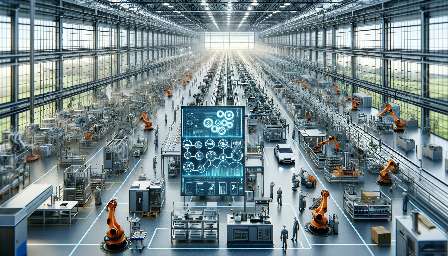Material handling plays a crucial role in the success of any manufacturing facility. It involves the movement, protection, storage, and control of materials and products throughout the manufacturing process. The way materials are handled can significantly impact a facility's layout and the overall efficiency of manufacturing operations.
The Importance of Material Handling in Manufacturing
Efficient material handling is essential for maintaining a seamless production process. It encompasses various tasks such as transportation, storage, and control of materials, as well as the integration of processes which ultimately affect the facility's layout and the manufacturing workflow.
Integration with Facility Layout
Material handling has a direct correlation with facility layout as it influences the arrangement of machines, workstations, and storage areas within the manufacturing facility. A well-designed material handling system can maximize space utilization, streamline material flow, and minimize handling time, thereby shaping the overall layout of the facility.
Optimizing Workflow Through Material Handling
Effective material handling systems can enhance productivity by optimizing the movement of materials and products throughout the manufacturing facility. By minimizing material handling time and reducing the risk of damage or loss, these systems contribute to a more efficient workflow, ultimately improving the overall manufacturing process.
Types of Material Handling Equipment
- Conveyors: These are widely used for transporting materials and products along a production line, reducing the need for manual handling and speeding up the manufacturing process.
- Storage and Retrieval Systems: Automated systems for storing and retrieving materials can optimize storage space and improve inventory management.
- Forklifts and Industrial Trucks: These are essential for moving heavy materials and products within the facility, contributing to efficient material handling.
- Automated Guided Vehicles (AGVs): These self-guided vehicles are used for transporting materials and products, offering flexibility and precision in material handling operations.
- Enhanced Productivity: Streamlined material flow and reduced handling time contribute to increased productivity.
- Cost Reduction: Efficient material handling minimizes wastage and reduces operational costs.
- Improved Safety: Proper handling methods and equipment contribute to a safer work environment, reducing the risk of accidents.
- Space Utilization: Optimal material handling can maximize space utilization within the facility.
- Quality Control: Minimized material handling can reduce the risk of damage, leading to improved product quality.
- Automation: Utilizing automated material handling systems to optimize the movement and storage of materials and products.
- Workflow Analysis: Conducting a comprehensive analysis of workflow to identify areas for improvement in material handling.
- Employee Training: Providing training on proper material handling techniques and equipment operation to minimize errors and maximize efficiency.
- Continuous Improvement: Regularly reviewing and refining material handling processes to adapt to changing manufacturing needs and technologies.
Impact of Material Handling on Manufacturing
An effective material handling system can bring about numerous benefits to the manufacturing process:
Challenges and Solutions
Material handling also presents several challenges in manufacturing facilities, such as maintaining accuracy in inventory management, minimizing material damage, and ensuring efficient use of space. These challenges can be addressed through the implementation of advanced technology, automation, and streamlined processes.
Strategies for Effective Material Handling
Implementing efficient material handling strategies involves:
Conclusion
Material handling is an integral part of facility layout and manufacturing operations. It directly influences the efficiency, productivity, and safety of manufacturing processes. By understanding the importance of effective material handling, businesses can optimize their facility layout and enhance their overall manufacturing operations, leading to improved productivity, cost reduction, and a safer work environment.


